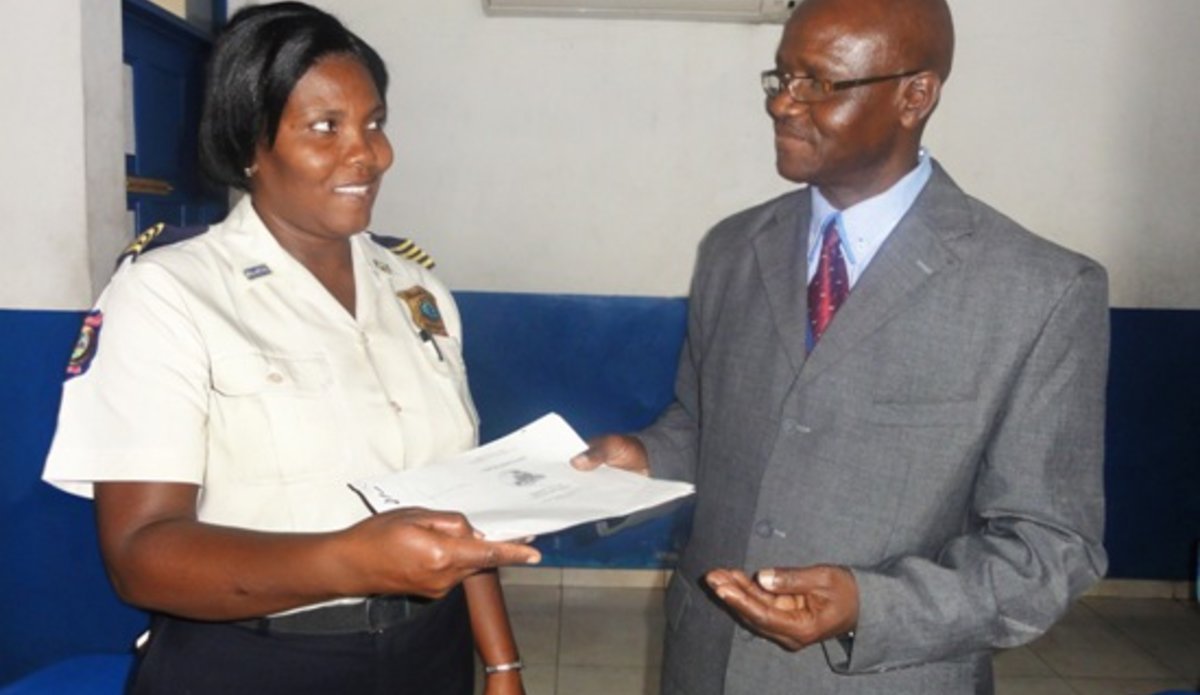Embalo Loba: From Guinea-Bissau to Haiti, wearing the uniform for human rights Embalo Loba: From Guinea-Bissau to Haiti, wearing the uniform for human rights
UN Volunteer working with MINUSTAH, Embalo Loba left behind Guinea-Bissau and his magistrate robe in order to promote awareness of human rights with the Haitian police.

|
Photo : UN/MINUSTAH |
“As a lawyer and former member of the military, I was hoping to put my expertise to use in the establishment of a police force that respects the population’s rights,” explained Embalo Loba, justifying his initiative. Wearing a two-piece suit one day, an informal shirt the next, the sixty-year-old Guinea-Bissau native has been touring Port-au-Prince’s police stations since 2011. The mission he set himself: advocating for human rights with the Haitian police.
In addition to his usual work agenda within the MINUSTAH’s police component, the civilian teaches the code of ethics, general discipline, general orders and the use of force to the active police force. “I have already trained over 100 members of the Haitian National Police (PNH) in stations located in Carrefour, Cité Soleil et Léogâne, before even arriving at Port-au-Prince’s station where I now have to train 400 people,” he proudly explained.
The former magistrate had to wait four years for his initiative to become a reality. Thanks to his strong convictions, Embalo was able to work around his schedule as a legal advisor to the police in order to tour police stations and train PNH members as a volunteer.
His supervisor, Commissionner Blai Eugène Digbeu, who directs the administration and general services at the United Nations Police (UNPol), recognizes Embalo’s will and commitment. “With his training initiative, the Legal Affairs Unit where he works has grown tremendously. His determination probably comes from his years as magistrate, where he had to judge criminal cases that involved members of the police force in his own country.”
An initiative the Haitian police appreciates
For Marie Michèle Gauthier, a police agent working at Port-au-Prince’s station, Embalo’s commitment has been beneficial. “It takes a strong will in order to leave Africa, one's family, and come to Haiti to help us at 60 years old”, declared Mrs. Gauthier. “We are still a young institution and we rejoice in having an experienced trainer among us”, she declared at the end of a class taught by Embalo.
As for Aubergiste Mario, Port-au-Prince’s main Commissioner, he also praised Embalo’s contribution. “If the police is better trained, the population will benefit from better services, and that’s what it has been waiting for”, explained Commissioner Mario.
By going beyond the usual framework of his mandate, “The Colonel” – as the Haitian police affectionately call him – believes he gets to enrich both his military and judicial experience. But, most of all, he also gets to discover “one tiny part of the rich Haitian cultural reality”. A discovery that the volunteer worker hopes to keep pursuing by widening training opportunities to the whole country.
 ONU
ONU Nations Unies Maintien de la paix
Nations Unies Maintien de la paix


